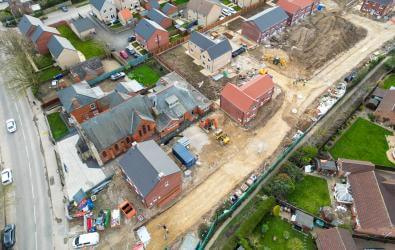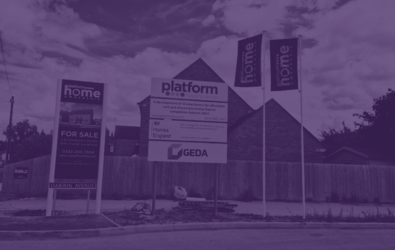The UK economy has experienced a tumultuous week following the announcement of a new mini-budget by Kwasi Kwarteng last Friday and the UK housing market hasn’t gone unaffected.
While rising interest rates and mortgage lenders pulling products indicate the potential for a slump, the introduction of stamp duty cuts, continued demand and rising transactions provide some reassurance.
It’s also important to note that the media has speculated about the downfall of the housing market since it reopened following COVID - over 2 years ago.
While there’s no denying that both house prices and rental prices have risen by unprecedented levels, could it be the case that we do not see the housing market crash and simply witness a correction in the market that has been overdue?
Below, we explore exactly what is happening in the UK housing market, what’s been announced and how exactly UK property has responded since the mini-budget announcement.
What is happening to the UK economy?
Before we delve into the property side of things, it’s critical to understand what is happening to the UK economy, particularly the UK currency.
Whilst the mini-budget announcement contained a number of positive initiatives for the property market, issues such as tax cuts represent a drastic change in economic policy that has effectively devalued the Pound (GBP) for foreign markets.
This meant that the Pound saw record lows over the last week, briefly falling into negative territory and sparking a panic for economists across the country.
Now, the Pound has started to gain once again and hit a one-week high at the time of writing, although trading remains volatile. As with many aspects of the economy, shifts such as a change of government or policy can have a large impact on the short-term outlook.
Similarly, despite a previous report suggesting that the UK had entered a recession, figures from the Office for National Statistics (ONS) suggest that the UK is not ‘technically’ in a recession and the UK’s economy has risen during the second quarter of 2022.
That said, the fact that the UK economy hasn’t returned to pre-pandemic levels is causing some concern and directly contributing to the ongoing housing market headlines.
What is happening to the UK housing market?
One of the most commonly searched questions in the country is ‘will the housing market crash?’ It’s a concern for millions around the UK and regularly makes the headlines.
For many then, despite the cost-of-living crisis and rising energy bills, the sudden downturn of the housing market has been a surprise, especially with record-breaking levels of transactions in August this year.
This u-turn has largely been underpinned by the Pound, which lost value dramatically at the start of the week following the mini-budget announcement.
Following this, many lenders were prompted to stop providing certain mortgage deals, reducing the available products on the market.
In turn, the Bank of England has since been quoted as saying it “won’t hesitate to change interest rates”.
It’s these two elements that have sparked concern for people but it’s important to remember that the housing market still works in cycles and we continue to see positive aspects within the broader landscape.
Whilst it’s impossible to predict the outcome of this scenario fully - there are far too many moving pieces moving too quickly - we can concentrate on what we know:
Mortgage Market
After the mini-budget suggested a series of overhauls to economic policy - including tax cuts - many mortgage lenders started pulling specific mortgage products as a means of mitigating the falling value of the pound and potential interest rate rises.
It’s estimated that around 1,000 mortgage deals have been pulled from the market, with around 507 taken from the buy-to-let mortgage space.
That said, data from Moneyfacts suggest that there are still 2,600 mortgage products available in the UK and 1,220 available for landlords. This shows there’s still a wide range of choices for buyers that are looking to move.
Whilst the Bank of England hasn’t ruled out further interest rate rises following an increase to 2.25%, we’re still lower than we were between 2000 and 2008.
The important thing to remember is that if you’re on a variable rate deal with your mortgage - such as a base rate tracker - the rising interest rate will impact your mortgage repayments. Remortgagers must also consider higher mortgage costs when finding a new deal, as even fixed-rate mortgages have factored the latest rises into their prices.
First-time buyers have the same challenge, although they receive some benefits in the form of stamp duty changes. With the nil-band rate increasing for all buyers on the first £250,000 of the property value - representing a third of properties on Rightmove - first-time buyers can also take advantage of a nil-band rate on the first £425,000 of the property value and 5% from £425,001-£625,000.
House prices and transactions
As you’d expect, house prices and property transactions are naturally linked to the level of activity occurring across both the economy and the property market.
House prices saw a 0% increase this month, representing the first time that property prices haven’t risen since July. This has also meant that annual growth in prices has dropped slightly, now sitting at 9.5%.
Although many of the UK’s regions have seen no growth in house prices, it’s critical to remember that this is following a period of record-breaking growth and price cooling reflects a natural correction in the market.
As price growth continues to slow, there is the potential that house buyers may have to review what they can afford and the potential of affordable home ownership schemes will grow. Initiatives such as Shared Ownership and Rent to Buy will continue to act as an alternative for those that want to explore their options.
At the same time, house prices represent a highly-volatile way of measuring market performance. If we were to base the ongoing performance of the property market on transactions, the outlook is more positive.
According to Rightmove, this week saw the highest one-day transaction volume since early August, while buyer demand is 20% higher than the pre-pandemic five-year average.
Supply is also on the increase, helping mitigate affordability issues. The amount of new homes on the market has risen by 8% compared to 2019 levels.
What does this mean for you?
As always, the right course of action depends on your current financial situation and where you stand in terms of your mortgage.
While there aren’t as many products to choose from, it’s increasingly likely that rates will increase over the next year.
For anyone that is looking for a new mortgage deal - whether they’re remortgaging or a first-time buyer - the general consensus is that your cheapest option is to buy now rather than later.
If you have a current mortgage deal with six months or less, you may also be able to secure a better rate now due to mortgage offers typically lasting for six months.
Finally, although the overall benefit of the stamp duty cuts may be impacted by rising rates, it still represents a saving during a difficult period.




